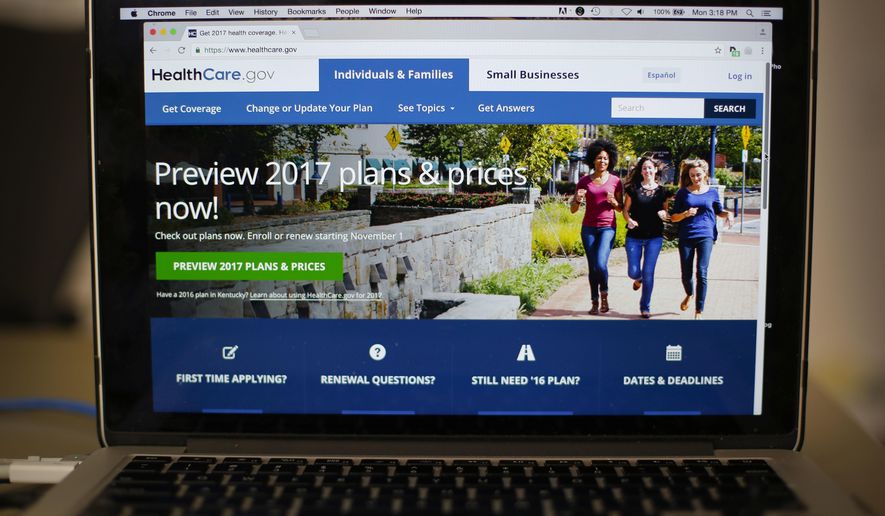WASHINGTON (AP) - Congress may be moving to repeal “Obamacare,” but millions of people are still signing up. The administration said Tuesday that 11.5 million enrolled nationwide through Dec. 24, ahead of last year’s pace.
Administration officials said about 290,000 more people have signed up than at the same time last year, evidence that the Affordable Care Act is on sound footing despite rising premiums, dwindling choice and healthy people holding back from getting coverage.
Separately, the IRS said Tuesday that the average fine for those who remained uninsured more than doubled for the 2015 tax year, rising to $470. The law requires virtually all Americans to have coverage or risk fines.
While acknowledging what they call “headwinds,” Obama administration officials said the latest sign-up numbers refute claims by GOP leaders that the health care law is in a “death spiral” and about to collapse because of its own problems. Among the Republicans making such claims are President-elect Donald Trump, House Speaker Paul Ryan and Senate Majority Leader Mitch McConnell.
“This market is not merely stable; it is on track for growth,” said Aviva Aron-Dine, a senior adviser at the Department of Health and Human Services. “Today we can officially pronounce these death spiral claims false.”
On Capitol Hill, Ryan showed no signs of changing his tune. He cast the GOP repeal drive as a rescue mission. “We are in the middle of a rescue mission to save the families who are getting caught up in the death spiral that has become Obamacare,” he told reporters.
An outside analyst looking at the numbers said it’s conceivable that the health law’s markets could stabilize this year without any action by lawmakers. Larry Levitt of the nonpartisan Kaiser Family Foundation said sharp premium increases for 2017 do not seem to have driven away droves of customers. About 8 in 10 receive subsidies that are designed to increase if the cost of insurance goes up.
“With sign-ups holding steady there are absolutely no signs of a market collapse,” said Levitt. “The higher premiums insurers are charging in 2017 suggest that more insurers will likely be turning a profit on marketplace business this year.”
One major caveat: The administration report provided no information on people buying individual policies outside of HealthCare.gov and state-run insurance markets. An estimated 5 million to 9 million customers outside the government marketplaces get no subsidies and may bear the full brunt of premium increases.
The health law expanded coverage through a combination of taxpayer-subsidized private insurance and a state option to expand Medicaid for low-income people. Experts say it’s largely responsible for reducing the nation’s uninsured rate to a historic low of about 9 percent.
The administration has set a goal of 13.8 million people signed up by the time open enrollment ends on Jan. 31. Officials believe a strong finish will bolster the case for preserving President Barack Obama’s signature domestic policy achievement.
With the final deadline less than three weeks away, the administration is planning advertising and grassroots outreach to millions of people who qualify for subsidized coverage under the law, but remain uninsured. The IRS is also involved, sending reminder letters to people who paid tax penalties for being uninsured that they can avoid future fines by signing up.
Data released Tuesday by the IRS for the 2016 tax filing season showed that the average fine jumped, although the number of taxpayers penalized went down. Under the law, the dollar amount of penalties for being uninsured increases with time. It’s meant as a stiff nudge to get healthy people into the insurance pool.
The IRS said the average fine rose to about $470 for tax year 2015, compared with an average penalty of about $210 for tax year 2014. About 6.5 million households paid the penalty, which remains the most unpopular feature of the health law. For tax year 2016, the basic fine is $695, and it’s scheduled to increase thereafter for inflation.
Republicans have promised to repeal the so-called individual mandate to carry insurance and the fines that enforce it, which are deducted from taxpayers’ anticipated refunds. But if the GOP wants to preserve guaranteed coverage for people with pre-existing medical problems, Republicans will have to find other ways to compel healthy people into the insurance pool to help keep premiums in check.




Please read our comment policy before commenting.